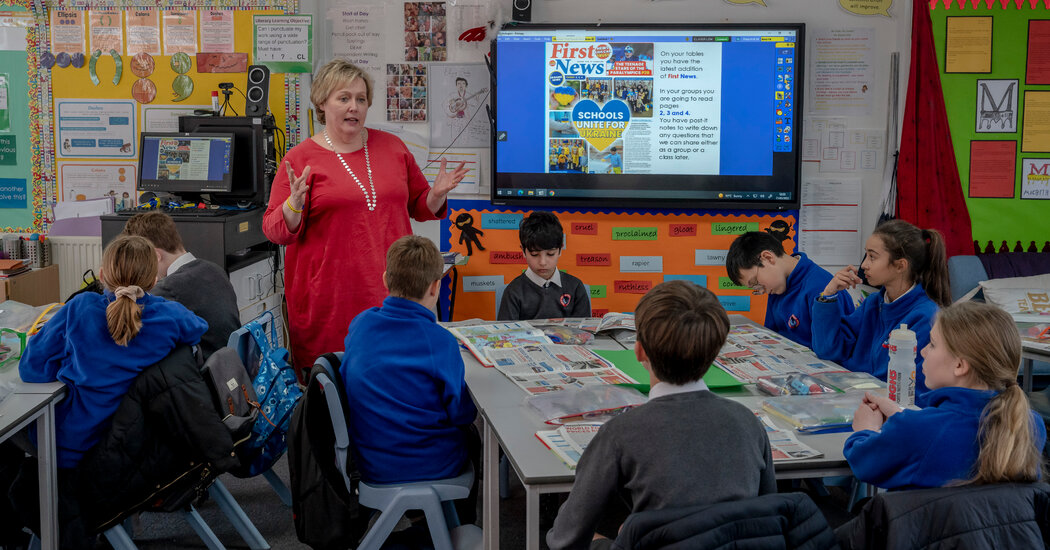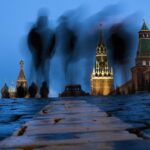
HORSHAM, England — As they returned from playing tag at recess on a recent sunny morning, the red-cheeked children had lots of questions.
“Russia is big enough, why does he want more land?” Max, 11, his eyes on an atlas, asked his teacher about President Vladimir V. Putin of Russia. Jessica, 11, stood with a knee on her chair. “Why are most crazy people men?” she wondered. Issy, 11, turned to the teacher: “Would you stay and fight for your country?”
Tara Harmer, a teacher of 36 years, paused to think. “It’s a difficult one, isn’t it?” she said in her elementary school classroom in Horsham, a town in southern England. “My instinct would be to protect you,” she reasoned. “Yes, I think I would fight for my country.”
As Europeans have grappled with the shock of facing a war on their doorstep and a frenzied news cycle, many teachers have had little time to process what was happening — they had to provide answers, and fast.
“I have had 100 questions,” said Sandro Pellicciotta, who teaches geography at a high school in the northern Italian city of Bologna. “And to be honest I am quite afraid of saying some nonsense.”
Schoolchildren today were born long after the Balkan conflicts of the 1990s, and some were toddlers when the war in Syria was at its height. No conflict they are old enough to remember has been so widely displayed on their TikTok feeds as the war in Ukraine, or so close to home.
The distance between their world and that of geopolitics has telescoped, and teachers have struggled to assuage fears that this war might affect them all. After two years of a pandemic, they also say the war has undermined their efforts to convince children that the world is not a hostile place.
Teachers across Europe, many reached by telephone, described the challenges they were facing in the classroom and the questions they had been asked.
In Marseille, a 10-year-old student raised his hand to say he felt like hiding. An 18-year-old boy in Warsaw worried he might be called up to fight, and a 16-year-old in Milan said she could not imagine what the future held for her. In Tuscany, a boy wondered if someone had bombed the Eiffel Tower after watching a faked video of an attack in Paris.
Governments around Europe have acknowledged the challenges that the war in Ukraine poses for teachers and have drafted guidelines for them.
The British Department for Education said the situation “raises issues some schools and teachers may never have encountered before.” It advised teachers to “establish the facts” and promote discussion, and provided resources to fight disinformation.
In France, the government said teachers should explain the common history of Russia and Ukraine, but make clear that it “does not substantiate the thesis that Ukraine, a sovereign state, does not have the right to independence.” According to the guidelines, teachers should also not insist on discussing the war if students are reluctant to do so.
Stanislaw Dutka, a teacher in Warsaw, agreed with this approach, but on the first day after the invasion, his seventh-grade students asked to stop the lesson and talk about Ukraine.
First, he gave them papers to draw and calm down, then he asked if they had something to say.
“All the hands went up,” he said. “It was sort of auto therapy.”
In February, Mr. Pellicciotta’s students were intent on grilling him about whether there would be a war. When it started, they wanted to know more. “If you were in Putin’s shoes, would you have attacked?” a student asked him.
In a conflict that has been called the world’s “first TikTok war,” children and teenagers have had access to a mass of information that is often unverified and troubling, and may trigger anxieties. Mr. Pellicciotta said he was happy that his students came to him with questions, so that he could explain what was false and what was not.
He said understanding geography was critical. “The beauty of geography is that it gives you tools to interpret reality,” he said. “It does not give you answers.” He displayed a map of Ukraine, showing how it had access to the sea and its plains, coveted resources for an ambitious foreign leader.
What was hard, he said, was to give an unbiased account in classes that were divided between students who saw Mr. Putin as “cool and tough” and others who called him a “beast.”
For other teachers, bias was not an issue.
“It’s such a blatant imperialistic war,” said Thor Alexander Almelid, a teacher at a Norwegian elementary school in the Oslo area. “It’s simply a question of right and wrong.”
In his seventh-grade classroom, he pulled down the world map — which he said was still conveniently from the 1980s, depicting the Soviet Union — and explained that the world had been near the precipice before, but that diplomacy held back a nuclear war. Ultimately, though, he said that they just had to hope it would not happen.
“I did my best to calm them and reassure them,” he said. “But I don’t want to lie to my students.”
With younger children, the balance between truth and reassurance has leaned toward the latter.
“Putin is a bit like that, he fights with his neighbors — don’t your parents fight with their neighbors?” Jessica Scambiato Licciardi, a primary schoolteacher in Sicily, said to her third-grade class.
Russia-Ukraine War: Key Developments
When one child told her that Mr. Putin had killed children in hospitals, she answered that it happened by mistake. “I just cannot tell them that they kill children,” she said. “It’s too hard.”
Still, when fighter jets flew over the school — as they often do, because of a base nearby — a shiver went through the class. “Is the war coming here?” one asked. “Do we have Russians here?”
Ms. Licciardi explained that there were Russians in Italy, but that they were not evil and were not going to make a war.
Nicky Cox, the editor of First News, a British newspaper for children distributed in classes, said her publication had tried to deliver that message, too.
“We don’t want Russian children to be picked on and bullied because of Putin,” she said. “We know that it’s happening.”
When Emeline Boutaud, a high-school teacher in Paris, saw images of the invasion on TV while on vacation, she immediately thought of her students.
“How can I find the words?” said Ms. Boutaud. “I myself don’t understand it.”
When she returned to the class, she was relieved when a volunteer from a news literacy organization joined her for a workshop about the war in Ukraine.
Members of the organization, Entre les Lignes, or Between the Lines, have in recent weeks toured French schools and explained that no, Mr. Putin did not want to “rebuild the U.S.A.,” as one confused student had said, and that threatening to use a nuclear bomb does not necessarily mean he was “going to do it.”
Sandra Laffont, the organization’s founder, said she was shocked by the level of dread among the 10-year-olds she recently visited in Marseille. She showed the distance between France and Ukraine on a map, and explained that France was not on the brink of war. But she said that teachers must feel comfortable with the fact that they will not have all the answers.
“Like why did Putin do this,” she said. “I don’t have an answer to that.”
Many students, though, have come up with their own solutions.
Jessica, from Ms. Harmer’s class in England, suggested that Ukrainians could dry rivers with “thousands of sponges” so that Russian tanks would crash into the empty ditches. For Ajay, 11, the answer to the conflict was evident in his atlas.
“They are just two different countries,” he said. “One is big and green the other is small and pink.”




